stjos.co.uk Subjects and Courses 25–26







I am delighted to welcome you to the warm, inspiring and inclusive environment of St Joseph’s College Sixth Form. This is an environment where each student is encouraged to challenge themselves academically and develop their skill set. Students learn how to work both independently and collaboratively and experience the broad range of extra and super-curricular activities offered. The Sixth Form team and I are focused on a student-centred approach to learning and personal development which ensures that every student is motivated and encouraged to study academic courses which will enable them to achieve their highest potential.
My personal journey into teaching was preceded by a career in publishing, where I worked in dynamic and highly competitive environments for a wide number of national publications, ranging from the Daily Mirror to Harper’s Bazaar. Having attained my PGCE in 2011, I returned to studying in 2015 and gained my Master’s degree in English Literature. In the 11 years I have been at St Joseph’s College, I have worked as an English and Digital Media teacher, Assistant Head of Upper School, Assistant Head of Sixth Form and Head of Sixth Form.
Working with students in their final two years of secondary education is hugely rewarding and we are always delighted to see our students progress, not only on to outstanding university destinations but also degree apprenticeships, gap years, work experience and volunteering. Whilst in the Sixth Form, students are encouraged to take part in the Prefect selection process and to become Prep Ambassadors, helping with the youngest children in the College in the nursery and Prep school. Volunteering in a local old people’s home is also encouraged.
The broad range of academic pathways on offer at St Joseph’s ensures that each student can access the next stage of their academic career or apprenticeship with the appropriate qualifications. Our aim is to facilitate the students’ next steps whilst ensuring that they engage fully with the breadth of opportunities available to them at St Joseph’s. Our College motto, Fides, Labore et Tenacitate, Faith, Hard Work and Tenacity, creates the core of our ethos and guides our students to success in all areas throughout their time here.
Ms Katherine Simpson-Jacobs
BA PGCE MA JP Head of Sixth Form
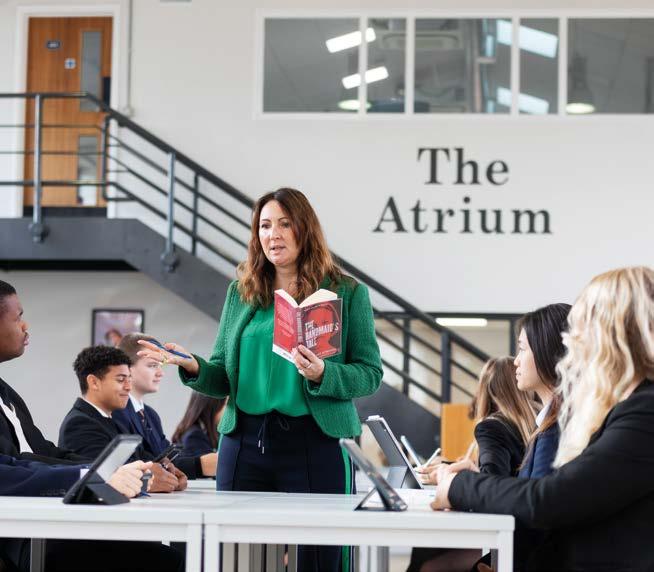

Biology A-level
Business Studies A-level
Business Studies BTEC
Chemistry A-level
Computer Science A-level
Digital Media CTEC
Drama & Theatre Studies A-level
Economics A-level
Engineering BTEC
English Language A-level
English Literature A-level
Esports BTEC
Fine Art A-level
Geography A-level
History A-level
Leiths Cookery
Mathematics A-level
Further Mathematics A-level
Mathematical Studies
Music A-level
Photography A-level
Physics A-level
Politics A-level
Psychology A-level
Sociology A-level
Spanish A-level
Sport Coaching and Development BTEC
Textiles A-level
Grade 6 Biology
Grade 6 Mathematics, Grade 6 English
Four Grade 4 or above, including English
Grade 6 Chemistry and Grade 6 Mathematics
Grade 7 Mathematics
Four GCSEs including English at Grade 4 or above
Grade 6 Drama
Grade 6 Mathematics
Grade 5 English and Grade 5 Mathematics
Grade 6 English Language
Grade 6 English Literature
Four GCSEs including English and Mathematics at Grade 4 or above
Grade 6 Art
Grade 6 Geography
Grade 6 History
Four GCSEs at Grade 4 or above
Grade 7 Mathematics
Grade 8 Mathematics
Grade 5 Mathematics
Grade 6 Music
Grade 6 Photography or Art
Grade 6 Physics and Grade 6 Mathematics
Grade 6 English
Grade 6 English and Grade 6 Mathematics
Grade 6 English
Grade 6 Spanish
Four GCSEs at Grade 4 or above
Grade 6 Textiles or Grade 6 Art
For many students, traditional A-level courses are the natural route to university. From the wide range of courses available, we ask students to choose four subjects at the beginning of Lower Sixth with a view to refining this to three subjects in December. This approach allows students to experience a range of courses before making their final choices. All A-level students will be entered for the AS-level public examinations at the end of Lower Sixth. This is to ensure that students remain focused throughout the first year of study. The results from these examinations will help to inform progress and aid predictions for UCAS applications in the Christmas term of Upper Sixth. In addition, all students taking one or more A-levels will be entered for either the Extended Project Qualification or Mathematical Studies AS level.
Universities widely accept vocational courses and a number of students prefer the focus of continuous coursework in conjunction with examinations to the linear assessment of A-level, with its greater focus on final examination at the end of Upper Sixth. These targeted Level 3 vocational qualifications include BTEC Business Studies, BTEC Sport Coaching and Development, BTEC Engineering and CTEC Digital Media. These courses are equivalent to A-levels and are recognised by the majority of universities. Students are able to mix A-level and vocational courses if they have the requisite grades at GCSE.
Students will be given homework and/or additional research tasks every lesson and they must utilise their timetabled study periods effectively. All students should complete a minimum of two hours additional study in each subject per day to be working at the required level for Sixth Form.
North American colleges are becoming an increasingly popular destination. St Joseph’s is able to facilitate students wishing to take the SAT admissions test as part of their application to universities in the USA.
The EPQ is an exciting opportunity for students to practise their project management skills and to design, implement and write up a research project of their choosing.
The academic rigour of the qualification is recognised by universities, reflected in the reduced offers made to students achieving an A or A* final grade. The EPQ allows students to demonstrate their expertise and passion for a topic in an individually focused and academically advanced project. We encourage all eligible students to take the EPQ.
As an alternative to the EPQ, Mathematical Studies is also offered to those students who wish to extend their Mathematics beyond GCSE but without committing to the full A-level.
Some students joining Sixth Form wish to improve GCSE Mathematics and English Language grades and lessons are provided to support this. For some international students, we offer the opportunity to undertake a three year A-level programme with the opportunity to improve English language skills and secure strong IELTS scores alongside initial studies in their first year.
Students wishing to study BTEC courses are expected to hold five GCSEs at grade 4 or above (the equivalent of the previous C grade). For students to complete A-level courses successfully, we would expect that four of their GCSE grades would be at grade 6 or above. A grade 6 minimum is required in subjects they go on to study at A-level.
Our Sixth Form offers a rich diversity amongst our student body, with different academic routes being taken, a good mix of girls and boys, and an international feel, with overseas students being part of our strong boarding community. Our class sizes remain small, so students receive individual attention to support their progress.
Each student is known and cared for personally, with their progress tracked individually. We are able to offer an environment that has a safe, friendly, family feel with a real sense of community.
Whilst academic progress is of course central to our aims, we wholeheartedly embrace a more holistic approach to Sixth Form life and are keen to encourage opportunities for wider skills development, including leadership, team-working, communication and empathy for others. As students enter our Sixth Form, they have the opportunity to make a valuable contribution to College life and to the wider community. This helps to prepare them for the decisions and responsibilities they will face in the future. Students leave our Sixth Form as well-rounded young adults with an excellent perspective on both themselves and the world in which they will live and work.
Together with extra responsibility comes increased freedom; our Sixth Formers gain some experience of independence before they leave us. Arrangements in the Sixth Form are designed to mirror this: students have their own kitchen area (the Hub), a silent study area (the Reading Room), the outside space of the Quad and Serenity Garden and a common room (the Atrium), as well as full use of the central College Library.
Much attention is paid to helping students bridge the gap between the guided study of GCSEs and the self-discipline that is necessary to succeed at Sixth Form level. The friendly support and cooperation of tutors and subject teachers ensures that there is a smooth transition.
This booklet is designed to give you information on all the courses on offer. We would be delighted to welcome you to explore our Sixth Form for yourself at one of our Open Days, Snapshot Mornings or at the Sixth Form Open Evening.
Please note: Should there be insufficient demand, a course may not be delivered.
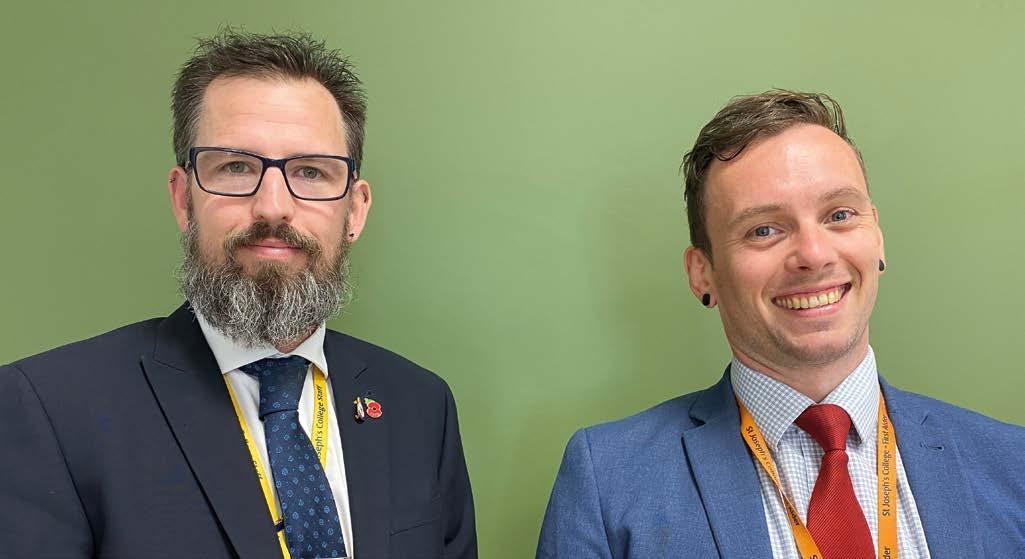
I started my career in the Royal Navy at the age of 17, spending six years in the Service. During my time in the Royal Navy, I gained a Foundation Degree in Marine Systems Engineering, alongside a lot of other formal and informal training and qualifications. After leaving the Navy, I attended the University of Portsmouth to complete my education and after one year gained a degree in Mechanical Engineering.
Having spent some of the most influential years of my life learning and training others in a high-pressure but incredibly passionate environment, I realised that I wanted to spend the rest of my career training and teaching people. I was accepted onto a teacher training PGCE with the Colchester Teacher Training Consortium in 2013 and joined Mayflower High School in Billericay in 2014, where I taught for eight years and had many roles and responsibilities.
I joined St Joseph’s College in 2022 as the Head of Engineering and I am very thankful that I was given the opportunity to do so. Since starting here, I have found many enthusiastic and like-minded staff who want to help students succeed. I have also met some truly exceptional students, who benefit from the opportunities given to them inside and outside of the classroom. I am now delighted to have the opportunity to join the Sixth Form team and help to continue to shape and improve our students’ experience.
Richard Kempin BEng PGE EngTech MIET Head of Lower Sixth
I graduated from the University of Essex in 2008 with a 2:1 in Biomedical Science, having been inspired to pursue this course by a deep fascination for the sciences. Having completed hospital placements as part of my studies, I was clear that laboratory-based work was not for me. However, education was a profession that really appealed to me due to the interaction and engagement of working with young people.
I have taught in various settings and schools and have always found that the challenges and rewards of working with young people have made my job hugely enjoyable. Upon completing my teacher training, I worked at Thurstable School in Tiptree and developed my skills among an excellent group of teachers. After two years of teaching in England, my wife and I decided to have an adventure which led to us spending four years teaching in Mexico. We loved our time there and returned in the Summer of 2021.
Lucky enough to secure a teaching role at St Joseph’s College, I immediately fell in love with the school. Pastoral work is at the heart of my teaching career and when the opportunity arose to work in the Sixth Form I jumped at the chance. It is a role I previously held in Mexico. I hope to remain with our wonderful Sixth Form team for years to come and look forward to playing a small part in shaping the futures of the outstanding young people in our community.
Simon Stevenson BSc PGCE QTS Head of Upper Sixth
My role as Futures Adviser at St Joseph’s College is to prepare students for all their professional plans beyond school. I effectively add value to the service we can offer our students over and above their academic studies by helping to give them further enrichment opportunities and effective contact with the world of work.
A large number of our students will go to university and I assist in choosing courses and helping them with the application process. I am also very experienced at supporting people to choose the correct career paths for them beyond further education. I assist students in securing full or part time employment, as well as voluntary work, which is particularly helpful for those looking at apprenticeships as an extra option instead of, or alongside, university applications. Building on my own career experiences, I help students steer successfully through job selection processes, however straightforward or complex they may be.
Following my own graduation, I worked in industry for 25 years, running various human resources and recruitment businesses in the UK and abroad. We have two children who were lucky enough to study at St Joseph’s; both left with excellent grades thanks in a large part to the superb support they received in Sixth Form from the staff and their amazing student peers. Both progressed to university where they continued to engage in a wide array of extracurricular activities. Engagement in all that is on offer is always encouraged at St Joseph’s as it helps students hugely when they head into the world of work. I, myself, have been at St Joseph’s College for seven years. I am a fully qualified careers adviser and get enormous job satisfaction from adding value, helping students (and their parents) looking for extra guidance that will help them towards a brilliant future.
David Kemsley BSc CEAG MCDI Student Futures Adviser

Why choose this course?
Biology has a wide range of exciting topics which will allow you to develop your skills of data collection and analysis, investigating facts and making deductions, and using team work and communication.
SECTION
1 Biological molecules
2 Cells
3 Exchange of substances
4 Genetics and variation
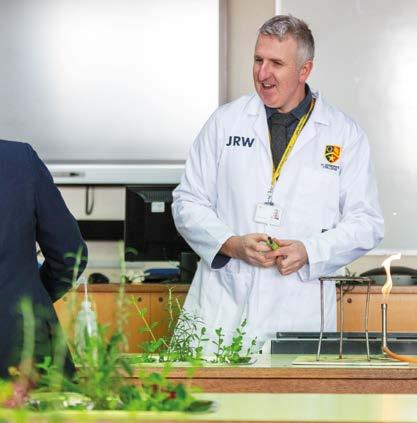
Biology: Cells; Specialised Cells & Tissues. Chemistry: Atoms; Moles; Titrations & Concentrations. Physics: Waves & Communication
Cell structure; Microscope work; Transport across cell membranes; Cell recognition & the immune system
Gaseous exchange; Mass transport; Transport in animals & Transport in plants
Genetic information; Evolution & disease; DNA & protein synthesis; Biodiversity; Classification & evolution
5 Energy transfer Photosynthesis; Respiration; Ecosystems & Nutrient cycles
6 Communication, homeostasis and energy
7 Genetics, evolution and ecosystems
8 The control of gene expression
Practical endorsement: students will cover set practical tasks in which their skills will be assessed internally. The skills covered will also be assessed in the written examinations.
There will be opportunities to hear key speakers and take part in national competitions such as the Biology Olympiad.
Communication and homeostasis; Excretion as an example of homeostatic control; Neuronal control; Hormonal control; Plant & animal response
Cellular control; Patterns of inheritance; Ecosystems; Populations & sustainability
Manipulating genomes; Cloning & biotechnology
Ongoing throughout the course
Biology is an excellent A-level for those who intend a career in medicine, dentistry, physiotherapy, nursing, psychology, medical sciences, human biology, biological sciences, sport science, agriculture, horticulture and forestry, and associated undergraduate courses.
Edexcel (9BSO)
Business Studies is a highly transferable subject which opens up many routes into employment and supports the study of Business at university, where Business Management degrees are popular. Furthermore, to those students seeking to enter the world of work after A-levels, it provides valuable grounding in key terms and areas that will affect them during their careers.
The course aims to encourage students to develop a range of essential soft skills for higher education and the world of work through content which is relevant to any citizen in the 21st century and through practising communication skills. Through exciting and relevant topics, such as marketing, human resources and finance, students will understand the broad nature of business whilst focusing on some key areas, including language and the creation of balanced arguments with clear and seasoned judgements.
The course comprises four themes:
Theme 1 Marketing and people
Theme 2 Managing business activities
Theme 3 Business decisions and strategy
Theme 4 Global business

Three two-hour written examinations at the end of the course, with 100 marks available on each. Papers 1 and 2 are each worth 35% of the total qualification. Paper 3 is worth the remaining 30%.
Paper 1 Marketing, people and global business. Questions will be drawn from themes 1 and 4. The paper comprises two sections, A and B. Each comprises one data response question broken down into a number of parts, including one extended open-response question.
Paper 2 Business activities, decisions and strategy. Questions will be drawn from themes 2 and 3. The paper comprises two sections, A and B. Each comprises one data response question broken down into a number of parts, including one extended open-response question.
Paper 3 Investigating business in a competitive environment. Questions will assess content across all four themes. For paper 3, questions will be based on a pre-released context document. The paper has two sections, with both comprising a data response question broken down into parts, including one extended open-response question.
Revision sessions are available to support students and Enterprise provides an opportunity for them to engage in practical business activities.
Degrees and HNDs in Business and Management Studies, Accounting, Finance, Marketing, Human Resource Management, Economics, Psychology etc.
Business Studies is particularly useful for studying with another subject for a combined/joint degree e.g. Business and French, Business and Finance etc.
Edexcel BTEC Level 3 National Diploma in Business (601/7157/1)
Equivalent to two A-levels.
The Diploma is designed to be the substantive part of a 16–19 study programme for learners who want a strong core of sector study. This programme may include other BTEC Nationals or A-levels to support progression to higher education courses in business areas before entering employment.

The styles of assessment used in this qualification are internal and external, a combination of internally graded assignments and external examinations. The assignments are based on business scenarios and students are asked to investigate and analyse business activities.
Unit 1 Exploring business
Unit 2 Develop a marketing campaign
Unit 3 Personal and business finance
Unit 4 Managing an event
Unit 5 International business
Unit 6 Principles of management
Unit 8 Recruitment and selection process
Unit 17 Digital marketing
• 8 units of which 6 are mandatory and 3 are externally assessed
• Mandatory content (83%) External assessment (45%).
• Examinations all learners take the same assessment at the same time.
• Set Tasks - Learners take the same assessment in a predefined window and demonstrate understanding through completion of a vocational task.
• Other units are internally assessed and subject to external standards verification
This qualification supports progression to higher education courses in business areas before entering employment or can also be used to progress to Higher Apprenticeships.
Chemistry helps you to develop research, problemsolving and analytical skills. It helps you to challenge ideas and demonstrate your thinking through logic and step-by-step reasoning. Chemistry also helps you to develop teamwork and communication skills, all of which are vital skills for the future workplace, whether that be in the sciences or beyond.
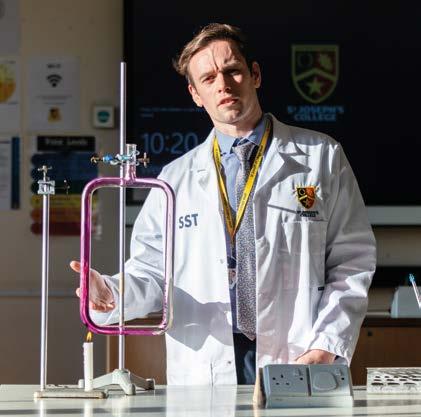
1 Development of practical skills in chemistry Key practical skills will be covered through practical tasks throughout the course
2 Foundations in chemistry Atoms, compounds, molecules and equations; Amount of substances; Acid-base and redox reactions; Electrons, bonding and structure
3 Periodic table and energy Trends in the Periodic table; Group 2 and the halogens; Qualitative analysis; Enthalpy changes; Reaction rates and equilibrium
4 Core organic chemistry Hydrocarbons; Alcohols and halogenoalkanes; Organic synthesis; Analytical techniques
5 Physical chemistry and transition elements Reaction rates and equilibrium; pH and buffers; Enthalpy, entropy and free energy; Redox and electrode potentials; Transition elements
6 Organic chemistry and analysis Aromatic compounds; Carbonyl compounds; Carboxylic acids and esters; Nitrogen compounds; Polymers; Organic synthesis; Chromatography and spectroscopy
COURSE ASSESSMENT
&
Paper 1 Periodic table, elements & physical chemistry Modules 1,2,3 & 5
Paper 2 Synthesis & analytic techniques Modules 1,2,4 &
Practical endorsement: students will cover set practical tasks in which their skills will be assessed internally and in examination questions
There will be opportunities to hear key speakers and take part in national competitions such as the Chemistry Olympiad.
PROGRESSION
Chemistry is a mandatory A-level for those who intend a career in medicine, dentistry and physiotherapy and useful in the study of nursing, psychology, medical sciences, human biology, biological sciences, sport science, agriculture, horticulture, forestry and associated undergraduate courses.
The OCR A-level Computer Science programme is designed to provide students with a comprehensive understanding of computer science concepts and principles. It offers a structured curriculum that combines theoretical knowledge and practical skills to prepare students for a wide range of future career opportunities in technology and computing-related fields.
1 Computer systems 40%

2 Algorithms and programming 40%
Students are introduced to the internal workings of the (CPU), data exchange, software development, data types and legal and ethical issues. The resulting knowledge and understanding will underpin their work in component 3.
It covers
• The characteristics of contemporary processors, input, output and storage devices
• Types of software and the different methodologies used to develop software
• Data exchange between different systems
• Data types, data structures and algorithms
• Legal, moral, cultural and ethical issues.
This builds on component 1 to include computational thinking and problem-solving.
It covers
• What is meant by computational thinking (thinking abstractly, thinking ahead, thinking procedurally etc.)
• Problem solving and programming – how computers and programs can be used to solve problems
• Algorithms and how they can be used to describe and solve problems.
140 marks 2 hours and 30 minutes written paper (No calculators allowed)
40 marks 2 hours and 30 minutes written paper (No calculators allowed)
3 Programming project 20%
Students are expected to apply the principles of computational thinking to a practical coding programming project. They will analyse, design, develop, test, evaluate and document a program written in a suitable programming language. The project is designed to be independently chosen by the student and provides them with the flexibility to investigate projects within the diverse field of computer science.
70 marks Non-exam assessment
We offer experienced and dedicated teaching staff, and the College has state-of-the-art computer labs for hands-on learning. We have a strong focus on preparing students for university and real-world tech careers. We give opportunities for extracurricular coding clubs and tech-related projects.
Completing the OCR A-level Computer Science course opens doors to various academic and career paths. Graduates can pursue degrees in computer science, software engineering, data science or related fields at top universities. Furthermore, the skills acquired are highly sought after in the technology industry, making this qualification an asset in the job market.
The creative industries are an important growth area in the UK, bringing significant cultural and economic benefits. The Level 3 Cambridge Technical Extended Certificate in Digital Media offers a range of units to reflect the breadth of employment opportunities within the media sector. Skills include:
• Analysis and evaluation of markets, audiences and media institutions
• Understanding of production processes
• Understanding of relevant legislation
• Development of a website and other media products
• Planning and pitching a media product

The course provides an ideal foundation for students as it gives them an understanding of media through a wide range of products, processes and technologies. This leads to the application of practical and creative skills which will transfer easily into the workplace or media courses at university.
The course comprises a number of compulsory and optional units including:
• Create a media product
• Interactive media products
• TV and short film production
• Social media and globalisation
• Photography for digital media products
• Create a digital animation
• 3D digital modelling
• Create audio-visual promos
• The creation and use of sound in media
• UK broadcasting
• Advertising media
• Plan and deliver a pitch for a media product
• Media products and audiences
• Pre-production and planning
Media-based trips and visits are undertaken, including creative advertising agencies and Media City in Manchester; work experience; involvement with College magazine; writing articles; film production and animation projects; filming content to be streamed during the Rugby Festival.
These include work placements in media companies and degree courses in a wide range of media courses.
A-level Drama and Theatre is a course designed to be practical, engaging and creative. It will provide opportunities to interrogate drama, explore a range of dramatic genres and techniques as a practical art form, and work independently to create your own performances, making informed artistic choices. Theory and practical work will be integrated throughout the course and all texts studied will be explored practically as well as theoretically.
Practitioners in practice (40%)
Exploring & Performing Texts (20%)

You will create your own devised performance based on, and influenced, by the work of others. This must include:
• The study of two practitioners
• The study/exploration of an extract from a play.
In addition to the performance, you will complete an accompanying research report and portfolio with evidence of the process you went through creating your performance.
You will perform an extract from a play to a visiting examiner during Upper Sixth. Performance lengths will vary according to the size of the group. The time range is between 15 and 45 minutes. You can work in a group of up to 8 performers.
You will complete an accompanying concept pro forma document which outlines your intentions for the performance.
40 marks
80 marks
50 marks
Analysing performance (20%)
This is a written exam that will be completed at the end of Upper Sixth. The exam is 2¼ hours long. There are two sections (A and B).
You will be asked about exploring a theme and how this can be bought out in a performance of two set texts from a list set by the exam board. The questions will focus on the process of creating and developing a performance, working as a director, performer and or designer, as well as the performance characteristics of the text.
Section B: You will be asked to analyse a theatrical performance you have seen. The question will focus on a specific aspect of the performance.
10 marks
30 marks
Deconstructing texts for performance (20%)
This is a written exam that will be completed at the end of Year 13. The exam is 1¾ hours long. There are two questions in the paper.
In question 1, you will be given an extract from a set text you have studied from a list set by the exam board. The question will ask you to annotate how you would direct a specific aspect of that theme.
The second question will focus on the process of creating and developing a performance as well as the performance characteristics of the text.
30 marks
30 marks
30 marks
Students will have the opportunity to participate in the annual College musical, and the Senior School play as well as taking on roles such as Performing Arts Prefect, to aid the development of younger learners as well as increasing their own depth of knowledge and experience. Trips to the theatre are an integral part of the course, and opportunities for overseas visits, such as the Performing Arts trip to New York, are an exciting addition to this A-level.
This course will prepare learners for the further study of Drama or Performing Arts at Higher Education level as well as developing transferable skills desired by all sectors of the industry. Our specification will help create independent learners, critical thinkers and effective decision makers – personal attributes that can make them stand out as candidates. OCR’s A-level in Drama and Theatre ignites and engages learners’ creativity and passion. Having separate performance and design components for the non-exam assessment allows learners to follow their own interests in depth. It also empowers them to experiment and take risks with their work while developing their own style.
Economics has been one of the fastest growing A-levels nationally for a number of years. The course supports a wide variety of future pathways, demonstrating analytical skills for those focusing on essay subjects and extended writing skills for scientists. The subject is highly topical, with one day’s news becoming the next day’s economics lesson. It also provides life skills by understanding the world we live in today, allowing us to take a reasoned opinion on Government policy decisions.
The A-level in Economics has four themes over the two year course:
Theme 1
Introduction to the markets & market failure
• The nature of economics
• How markets work
• Market failure
• Government intervention
Theme 2
The UK economy – performance and policies
• Measures of economic performance
• Aggregate supply and demand
• National income
• Economic growth
• Macroeconomic objectives and policy
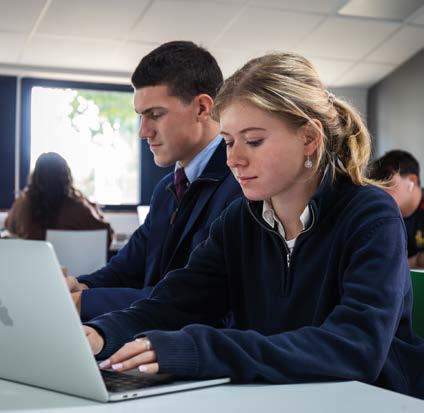
Theme 3
Business behaviour and the labour market
• Business growth
• Business objectives
• Revenues, costs and profit
• Market structures
• The labour market
• Government intervention
Theme 4
A global perspective
• International economics
• Poverty and inequality
• Emerging and developing economies
• The financial sector
• Role of the state in the macro economy
• Paper 1 & 2 follow the format: Section A comprises a range of multiple-choice and short-answer questions. Section B comprises one data response question broken down into a number of parts. Section C comprises a choice of extended open-response questions; students select one from a choice of two.
• Paper 3 assesses everything taught over the whole two years of the course. The paper comprises two sections. Each section comprises one data response question broken down into a number of parts, including an essay question.
The department is supported by a lively student-led Economics Society with a remit for exploring aspects of Economics from beyond the specification and inviting visiting speakers. The department is reinstating an annual trip to London to visit the Bank of England and other institutions within the financial district.
Economics is a popular degree at university, and can be studied on its own, or combined with a variety of other subjects. The study of Economics at A-level can also lead into other degree subjects such as Business and Finance. Possible careers include: Civil Service, insurance, management, accountancy and finance.
Pearson BTEC Level 3 National
Extended Certificate in Engineering
Pearson EDEXCEL
This course provides an attractive alternative to the traditional A-level for students who prefer to have more practical elements in engineering. The fundamental philosophy of this course is that you actively experience the engineering environment, including electrical and electronics engineering. You will also learn how to apply Mathematics and Physics in an engineering environment. BTEC courses encourage students to work independently, with teachers there to guide and facilitate learning. Some lessons are still delivered in a more traditional way due to their content, however great emphasis is put on independent, guided tasks.
Unit 1: Engineering principles – externally assessed
This unit will develop your mathematical and physical scientific knowledge and understanding to enable you to solve problems set in an engineering context.
Unit 2: Delivery of Engineering processes safely as a team –internally assessed
In this unit you will examine common engineering processes, including health and safety legislation, regulations that apply to these processes and how individual and team performance can be affected by human factors.
Unit 3: Engineering product design and manufacture – externally assessed
In this unit you will examine what triggers changes in the design of engineering products and the typical challenges that engineers face, such as designing out safety risks. You will learn how material properties and manufacturing processes impact the design of an engineering product.

Some units are mandatory and externally assessed. Optional units are internally assessed in the BTEC qualification in this specification. All assessment for the BTEC qualifications in this specification is criterion referenced, based on the achievement of specific learning outcomes. Each unit within the qualification has specified assessment and grading criteria which are to be used for grading purposes. A summative unit grade can be awarded at pass, merit or distinction.
EXTRA-CURRICULAR ACTIVITIES:
• STEM-related assignments and briefs
• National and international competitions
• Visits to local engineering companies
• Visits to the Design, V&A and Science Museums
• Study days at supporting universities
Progression from this qualification is either to an employer or higher education for engineering sector courses, such as degrees in Engineering, Electronics Engineering, Computer Science or Mathematics. This qualification also supports progression to job and apprenticeship opportunities in the engineering sector, which can range from world-class companies such as Rolls Royce and Dyson to embarking upon a career in the Armed Forces.
Jobs that are available in these areas include: aerospace engineer, automotive engineer, contracting civil engineer, control and instrumentation engineer, maintenance engineer, mechanical engineer, nuclear engineer.
Language is interlaced throughout every aspect of our lives: we scroll through news stories each morning, drive past signs and advertisements every day, talk with peers and colleagues habitually, and are exposed to language in different forms and contexts perhaps without even realising. The course equips you with the essential knowledge and understanding of how texts work, developing your ability to communicate effectively in a variety of genres, and for varied audiences and purposes. You will develop the skills needed to critically analyse and assess language, exploring how the written and spoken word is affected by personal, social and geographical contexts and how language choices can manipulate and control your perception of the world around you.
Paper 1
• Textual variations and representations
• Children’s language development (0-11 years)
• Methods of language analysis are integrated into the activities
Paper 2
• Language diversity
• Language discourses
• Writing skills
• Methods of language analysis are integrated into the activities
Written exam: 2 hours 30 minutes
100 marks
40% of A-level
Written exam: 2 hours 30 minutes
100 marks
40% of A-level
Non Exam
• Language Investigation
• Original Writing
• Methods of language analysis are integrated into the activities
• Word count: 3,500
• 100 marks
• 20% of A-level
• Assessed by teachers
• Moderated by AQA
Attend student seminars and workshops at prestigious institutions. Opportunities to visit the British Library to engage with research and documents. University visits and visiting speakers.
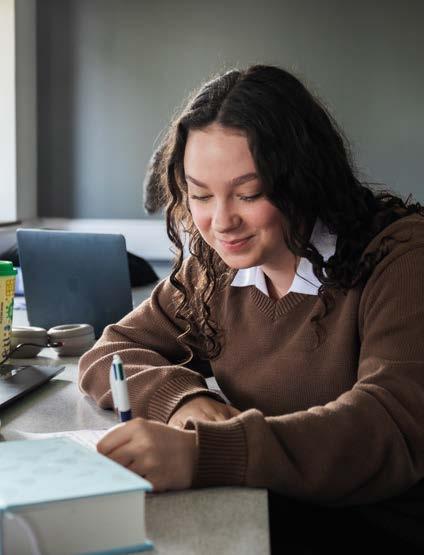
Section A - Textual Variations and Representations
Two texts (one contemporary and one older text) linked by topic or theme.
• A question requiring analysis of one text (25 marks)
• A question requiring analysis of a second text (25 marks)
• A question requiring comparison of the two texts (20 marks)
Section B - Children’s Language Development
A discursive essay on children’s language development, with a choice of two questions where the data provided will focus on spoken, written or multimodal language (30 marks)
Section A - Language Diversity
One question from a choice of two:
Either: an evaluative essay on language diversity (30 marks)Or: an evaluative essay on language change (30 marks)
Section B - Language Discourses
Two texts about a topic linked to the study of diversity and change.
• A question requiring analysis of how the texts use language to present ideas, attitudes and opinions (40 marks)
• A directed writing task linked to the same topic and the ideas in the texts (30 marks)
Students produce:
• A language investigation (2,000 words excluding data)
• A piece of original writing and commentary (1,500 words total)
As English Language is a traditional A-level, it is highly respected by universities and employers. It is a perfect choice for those planning a career where linguistic skills are prized. It is ideal for those wishing to pursue Higher Education courses in English, journalism, publishing, public relations, advertising, teaching, editing, law, psychology and the humanities. English Language works well with many subjects, including Psychology, Law, Media Studies, English Literature and Sociology.
The study of Literature allows us to understand the world in which we live now, worlds which have come before and worlds which hopefully, will never come. The ability to understand and empathise makes us human and literature offers a door into worlds we may never explore otherwise. To communicate with concision, clarity and compassion will make the paths students walk in the future less daunting, and this course will push students to think perceptively about humanity, culture and the strength of words.

Paper 1: Love through the ages Shakespeare – Othello
Selection of Pre 1900 Poetry
Unseen Poetry
The Great Gatsby
Paper 2: Texts in shared contexts –modern times
The Handmaid’s Tale Feminine Gospels – Carol Ann Duffy
A Streetcar Named Desire
Unseen Prose
Non-exam assessment: independent critical study – texts across time
Independent comparative critical study of two texts, at least one of which must have been written before 1900
Written exam – 3 hours Open book (not Othello) In addition to the performance, you will complete an accompanying research report and portfolio with evidence of the process you went through creating your performance.
75 marks 40%
Written exam – 2 hours 30 minutes Open book 75 marks 40%
One extended essay – 2500 words plus bibliography 50 marks 20%
• Experience live productions at a range of theatres
• Attend student seminars and workshops at prestigious institutions
• Opportunities to attend author events
• University visits/visiting speakers
• Attend stage-to-screen productions
English Literature is a highly regarded A-level that can take students in many directions of study. It is an obvious choice for English degree courses, but is also an excellent option for those considering arts and humanities subjects, languages, Business, Psychology and Law degrees.
Pearson BTEC Level 3
National Extended Certificate
Esports is defined as organised competitive gaming, which is human versus human, either as individuals or in teams. This suite of qualifications has been developed to meet the growing demand for skills in esports. The qualifications include a breadth of transferable skills that enable learners to experience different areas of esports to aid their progression to employment, either directly or via further study. Esports offers a unique opportunity to study a sector that crosses over multiple subject areas such as sport, marketing, enterprise, IT and the creatives. It provides an opportunity for alignment of social, physical, mental and financial skills into one qualification to deepen and expand learning. These are skills that are highly valued in the changing and fluid workplace. Learners must apply strategy, skill and teamwork to be successful. Students taking this qualification will study three optional and four mandatory units.

There are four mandatory units, all of which are internally assessed. Learners must achieve a Pass or above in all mandatory units.
Four GCSEs at grade 4 or above including English and Maths, or a Level 2 qualification (Merit or Distinction) in a related subject.
You do not need to have prior knowledge of - or experience in - Esports as a subject prior to applying; we will teach you what you need to know!
• Unit 1: Introduction to Esports
• Unit 2: Esports Skills, Strategies and Analysis
• Unit 3: Enterprise and Entrepreneurship in the Esports Industry
• Unit 4: Health, Wellbeing and Fitness for Esports Players
You need a positive, can-do attitude with plenty of enthusiasm for the creative industries. You will be eager to learn, bursting with potential and ready to challenge your understanding of the world in which we live. Collaboration will be necessary, so you will be capable of playing a key role in group work. You will need access to a computer at home, and ideally a form of gaming console (this can include PC).
The primary focus of the Pearson BTEC Level 3 National Extended Certificate in Esports is to progress to employment across a range of roles within Esports, but it might also be taken alongside other vocational qualifications or A-levels. Complementary qualifications to support career progression are Pearson BTEC Level 3 Nationals in Information Technology, Creative Media, Sport and Business.
AREAS INCLUDE
• Esports player
• Team coach
• Social media influencer
• Data analyst
Are you aspiring, enthused and creative? Ever fancied having your own studio space to work in to continue your passion during study periods? Then A-level Fine Art could be for you.
This is a practical, making and creating course which uses a vast range of specialist materials and art techniques. It is 60% practical portfolio and 40% practical exam.
The course embraces the current and emerging technologies as well as the traditional routes of art, craft and design, such as drawing, painting, printmaking and sculpture. It provides exciting opportunities for students to make personal journeys of discovery, learning why art and design matter and gaining experience of the working practices of individuals and organisations in the creative and cultural industries. By providing students with the freedom to experiment and take risks, we encourage them to develop their own style of expression. Students have a dedicated Sixth Form Art Studio where each of our emerging artists has their very own space in which to work during the course.

Component 1 (H601/01)
Component 2 (H601/02)
A coursework portfolio exploring Fine Art, based upon themes developed from a range of starting points. The Personal Investigation has two integrated elements: a portfolio of practical work and a related study, exploring context. Students will produce two elements: (i) a portfolio of practical work showing their personal response to a starting point, brief, scenario or stimulus, devised and provided by a combination of the students’ interests guided by the department; (ii) a related study - an extended response (minimum of 1000 words).
The externally set assignment incorporates two major elements: supporting studies and practical work. After a period of preparation, students have 15 hours of controlled time to develop their ideas into a final realisation. The early release paper will be issued on 1 February and will provide learners with a number of themes, each with a range of written and visual starting points, briefs and stimuli.
Working with artists, visits to galleries and museums in London, Cambridge and further afield in Europe.
A-level Fine Art complements other courses such as Photography, Mathematics, Physics, English Literature, Psychology, Textiles, Engineering and History. Beyond A-level, students can apply their skills and knowledge to degree and diploma courses such as Fine Art, Architecture, Fashion, Graphic Design, Marketing and Advertising.
Further career opportunities include specialised police professions, specialised insurance, curator, graphic designer, interior designer, fashion designer.
Art & Design students also develop skills which are favoured by universities and employers such as:
• Presentation skills and peer reviewing
• Interpersonal skills and communication
• Self-esteem and confidence building
Why choose this course?
Through exciting topics students will understand the nature of physical and human geography whilst unpicking the debates surrounding challenges facing the world today.
It covers both the physical and human environments and the complex interaction of processes that shape our world. It will also, importantly, show the applied side of the subject - how human intervention affects the environment and how people adapt and mitigate the effects of processes on their environment. There is plenty of room for discussion and extended research, which will help you become an independent thinker and learner.
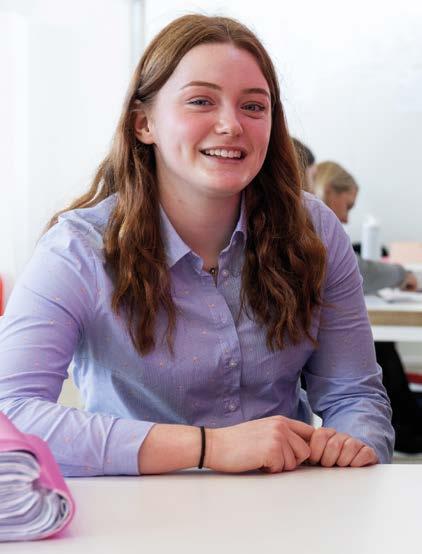
Physical systems
Earth’s life support systems: the water and carbon cycles vital to our planet. Landscape systems: either coastal landscapes, dry land landscapes or glaciated landscapes.
Human interactions
Global connections: trade or migration and the governance of human rights or sovereignty on a global scale. Changing Spaces; Making Places, which gives learners an insight into the nature of places and the fluidity of their meanings and representations.
Geographical debates
An in-depth study of two of the most challenging, dynamic and fascinating issues of the 21st century. Issues may include climate change, disease, food security, oceans, or tectonic hazards.
Investigative geography
An independent investigation linked to any aspect of the specification to satisfy students’ intellectual curiosity. Geographical skills include both quantitative and qualitative methods and will be integrated within the content taught.
We typically undertake fieldwork in the Lake District during either the Lower or Upper Sixth. The independent investigation allows for an in-depth study of an area of interest.
Geography aims to encourage learners to develop a range of essential skills for higher education and the world of work through content which is relevant to any citizen of the planet in the 21st century. It is highly valued by universities as an A-level choice, and combines well with both arts and science subjects. Geography opens doors to other degrees, such as business and administrative studies, law, engineering and technology, and the other social physical sciences.
OCR (H505)
Why choose this course?
History A-level offers students the opportunity to investigate historical questions in depth. It is designed to develop students’ interest in and enthusiasm for history and an understanding of its intrinsic value and significance. The course covers a variety of topics across time periods and ranges from political to social history. Students develop their analytical thinking, their research skills, and their academic writing.

Unit 1: British period study and enquiry
Unit 2: Non-British period study
Unit 3: Thematic study and historical interpretations
Unit 4: Non-exam assessment - Topicbased essay
Either England 1485–1558: the Early Tudors (Enquiry topic: Mid Tudor Crises 1547–1558)
This is a source-based study of British History and Politics which looks at domestic and foreign affairs under the reign of the Tudor Monarchs. It explores the challenges faced such as the religious upheavals and subsequent rebellions which took place. or Britain 1930-1997 (Enquiry topic: Churchill 1930-1951)
This is a source-based study of British History and Politics which looks at domestic policies as well as an in-depth look into Churchill as PM. The various Conservative and Labour Governments and Britain’s position in the world during this particular period will also be examined.
Democracy and Dictatorships in Germany 1919–1963
This study looks at the establishment and development of the Weimar Republic: 1919–Jan 1933, The establishment of the Nazi Dictatorship and its domestic policies Feb 1933–1939, the impact of war and defeat on Germany 1939-1949, Divided Germany: The Federal Republic and the DDR 1949–1963.
Britain and Ireland 1791-1921
This unit focuses on the relationship between Britain and Ireland during a period that witnesses significant political and social change. The political affairs of the House of Commons and House of Lords are key features of this unit.
The topic-based essay is an independently researched essay of 3000–4000 words in length. This unit is a non-exam assessment. The work will be marked by centres and moderated by OCR.
This course will include a visit and guest lecture at the Houses of Parliament and a field trip to the Battlefields in Belgium. The department is also planning a field trip to Northern Ireland.
History provides the skills and intellectual grounding that will open many doors. Whilst particularly suited as preparation for any Arts degree, history students are also successful in the sciences having acquired advanced analytical skills. History leads to many careers particularly; law, journalism, research, public relations, management, teaching, Civil Service, museum and archive work.
Favoured by Russell Group universities, Mathematics complements many other A-level subjects and is vital in various careers. The course covers processing, interpreting and analysing information, and develops logical thinking and problem-solving abilities. Mathematics is a fascinating course which constantly challenges and inspires. It provides the satisfaction of obtaining a correct answer and of understanding how different areas of mathematics are interlinked. It is truly a beautiful language.

Students will have met at GCSE level many of the topics to be studied at A-level, but these will be extended and studied in greater depth. Exciting and powerful new techniques, such as calculus, are developed in Pure Mathematics and are applied to the real world through the study of Mechanics and Statistics. Students considering taking Mathematics at A-level, will be expected to gain a GCSE grade 7 or above in the GCSE Mathematics higher tier or equivalent.
Three examination papers with a mix of question styles, from short, single-mark questions to multi-step problems, will be taken at the end of Upper Sixth. It is expected that students will plan considerable time to review lessons and complete homework. The Mathematics Faculty monitors the progress of each individual student by using a variety of assessed homework and end of topic reviews and individual support is available to all students.
Topic 1: Statistical sampling
Topic 2: Data presentation and Interpretation
Topic 2: Algebra and functions, Statistics
and Topic
Topic 3: Co-ordinate Geometry in the (x,y) plane
Topic 4: Sequences & Series
Topic 5: Trigonometry
Topic 6: Exponentials and logarithms
Topic 7: Differentiation
Topic 8: Integration
Topic 9: Numerical methods
Topic 10: Vectors
The Mathematics Faculty enters students into a number of external group competitions, including the UK Senior Mathematics Team Challenges, together with individual competitions. There are opportunities for students to act as Mathematics Ambassadors, helping younger students in the College.
Topic 3: Probability
Topic 4: Statistical distributions
Topic 5: Statistical hypothesis testing, Mechanics content overview.
Topic 6: Kinematics
Topic 7: Forces and Newton’s Laws
Topic 8: Moments
Mathematics is a much sought-after qualification for entry into a wide variety of full-time courses in higher education or employment. These include Science, Computing, Engineering, Mathematics, Psychology, Geography and Business. Having A-level Mathematics is a fantastic indicator to any prospective employer that you are able to think logically, work hard and have excellent numeric competency.
Level 3 Mathematical Studies (Core Maths) is a relatively new qualification designed for students who do not have the time or feel confident enough to undertake A-level Mathematics, but enjoy the subject and are keen to continue their studies and gain a valuable qualification, which is recognised by employers and universities.
It helps to develop students’ mathematical skills and thinking and supports courses such as A-level Psychology, the Sciences, Business Studies and Geography as well as technical and vocational qualifications.

In addition to the UCAS points this qualification offers (equivalent to an AS), some universities make lower offers to students who are studying this course, in their other subjects. It uses many of the number topics from GCSE, such as ratio and percentages, but applies them to real world issues currently in the news.
• Understanding Income Tax and exploring changes being suggested by the Government
• The impact of a virus pandemic
• Interpreting and critically evaluating statistical data
• Financial issues such as mortgages, APR on loans or credit cards and pay slips
• Making sensible estimates in a wide range of real-world contexts
The course focuses on mathematics in a real-world context, there is no geometry (including trigonometry) content and very little algebraic content.
This qualification is not a substitute for careers or university courses that require A-level Mathematics, but it does give you a valuable post-16 mathematics-based qualification.
There are two examinations and a calculator may be used in both. There is no coursework, but a pre-release data sheet is provided three months before the examination on a current news topic which will form the basis of some of the questions in the examination.
• Delivered over four lessons per fortnight, making it manageable alongside A-level courses
• Studied in one year, so students can focus on their ‘main’ subjects in Upper Sixth
• Equivalent to an AS level and carries useful UCAS points accordingly
• Increasingly, universities may make a reduced offer on a student’s ‘main’ subjects, such as AAA being reduced to AAB, for example
Studying A-level Further Mathematics is excellent preparation for a degree in Mathematics or Engineering. Many university maths departments encourage students to take Further Mathematics at A-level as it introduces a wider range of pure and applied content, such as matrices and complex numbers. It is favoured by Russell Group universities. This course provides the satisfaction of a challenge for the more able mathematicians, requiring a high level of analytical thinking and problem-solving skills.
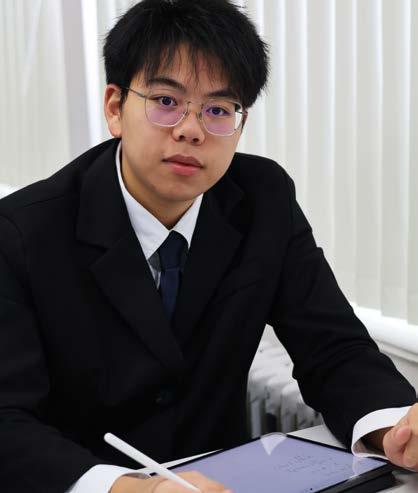
Students wishing to study Further Mathematics will complete the A-level Mathematics course in Lower Sixth and then the Further Mathematics course in Upper Sixth. As a result, this will comprise two option blocks. This will give students an opportunity to explore completely new areas of Mathematics and to deepen their understanding of others. Those considering taking Further Mathematics at A-level, will be expected to gain a GCSE grade 8 or above in the GCSE Mathematics higher tier or equivalent.
Four examination papers with a mix of question styles, from short, single-mark questions to multi-step problems, will be taken at the end of Upper Sixth. It is expected that students will plan considerable time to review lessons and complete homework. The Mathematics Faculty monitors the progress of each individual student by using a variety of assessed homework and end of topic reviews and individual support is available to all students.
Overview
Complex Numbers
Series
Roots of Polynomials
Volumes of Revolution
Matrices
Linear Transformations
Proof by Induction
Vectors
Polar Co-ordinates
Hyperbolic Functions
Differential Equations
Exam
Conic Sections
Inequalities
The T Formulae
Taylor Series
Numerical Methods
Reducible Differential Equations
Further Mechanics 1
Momentum & Impulse
Work, Energy & Power
Elastic Strings & Springs
Oblique Collisions
Support is available for those wishing to prepare for STEP and other university entrance exams. The Mathematics Faculty enters students into a number of external group competitions, including the UK Senior Mathematics Team Challenges, together with individual competitions. There are opportunities for students to act as Mathematics Ambassadors, helping younger students in the College.
Further Maths is highly desirable, if not required, by many top universities for Mathematics, Science and Engineering courses, as well as Computing and Economics.
Leiths Level 3 Extended Certificate in Professional Cookery
Gain vital skills for life with this professional qualification from the UK’s most prestigious cookery school. Develop core techniques and study the associated theory as you create delicious recipes. You will also master time management, menu planning, safety and hygiene, food presentation and healthy eating as you build a strong foundation in this growing, dynamic industry.
Choose St Joseph’s College for a unique opportunity to combine your A-level subjects, with this innovative, practical course. Written and run by Leiths,the UK’s most prestigious cookery school, and accredited by the Confederation of Tourism and Hospitality (CTH), this qualification is an A-level style course worth 12-36 UCAS points.
The course is delivered over five terms and is based on 46 core weeks of practical menus, which will develop a wide range of culinary skills. This qualification can play a pivotal role in opening the door to careers in food and drink - from cheffing to food teaching; cookery writing to food photography and journalism; recipe design and development to marketing and advertising.
COURSE HIGHLIGHTS
• Regular visits and lessons from teachers at Leiths Academy, London
• Assessments from Leiths professionals –leaders in their field
• A street food tasting trip
• Experience in catering for key St Joseph’s College events
• Career advice and support into employment via Leiths List
As well as gaining a leading industry qualification, which will set you on a path to enter the food and beverage industry, this course is a valuable addition to a UCAS Personal Statement.
UNIFORM AND EQUIPMENT
(ordered through the College)
• Chef jacket
• Chef trousers
• Bazley hat
• Leiths white apron
• Set of professional catering knives engraved with pupils’ initials
THIS COURSE INCLUDES PRACTICAL SKILLS AND THEORETICAL KNOWLEDGE. IT IS DESIGNED TO
• Hone key skills
• Concentrate on flavour and texture
• Develop confidence, creativity and maturity
• Enhance your employability
• Improve your time management, organisation and team-work skills
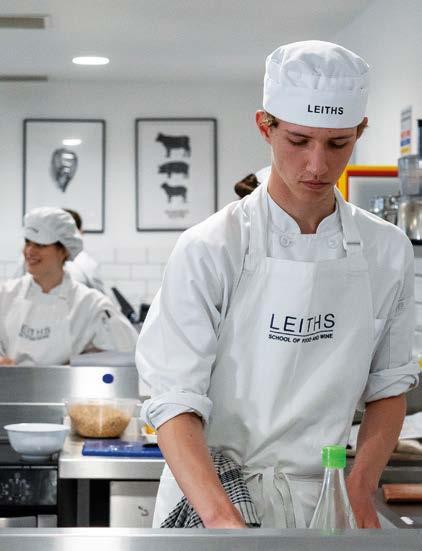
• Diverse recipes and catering skills
• Menu planning
• Food safety and hygiene
• Food presentation
• Healthy eating
On completion you will have a solid practical foundation, as well as an impressive repertoire, enabling you to cook confidently for yourself and for small groups.
• A practical cooking log of weekly tasting with evaluation of dishes cooked
• Online level 2 Food Hygiene and Safety for Catering with allergen awareness assessment
• Two three-hour practical assessments examined by Leiths
• Written menu planning coursework task
• Termly theory tests
• A group practical community cooking task with photographic evidence
GRADE BANDS FOR LEVEL 3 UCAS TARIFF
Accredited by the Confederation of Tourism and Hospitality (CTH)
• Pass (12 UCAS points)
• Merit (24 UCAS points)
• Distinction (36 UCAS points)
There is an additional charge for this course which includes uniform, ingredients and assessment fees.
The Edexcel qualification has a straightforward structure with three engaging components, assessed through practical performances, compositions and one externally examined paper. The key content of musical elements, contents and language are taught through the Areas of Study and set works to show real examples of how these are used within different types of music. Students investigate, analyse and evaluate music and its features. Building on this, and by using practical methods, they are encouraged to take a more holistic view of their knowledge, performance and compositional skills. The set works enable students to conduct in-depth studies into different musical styles and genres, and place these within a wider context. Students will learn to perform, compose and appreciate different types of music, developing critical and creative thinking, cultural, aesthetic and emotional awareness, and the ability to make music individually and as part of a group.
Component 1: Performing (Component code: 9MU0/01)
Component 2: Composing (Component code: 9MU0/02)
Component 3: Appraising (Component code: 9MU0/03)

Non-examined assessment: externally assessed, 30% of the qualification, 60 marks.
A public performance of one or more pieces, performed as a recital.
Non-examined assessment: externally assessed, 30% of the qualification, 60 marks.
A total of two compositions, one to a brief set by the examining body and one either free composition or also to a brief.
Two-hour written examination: 40% of the qualification, 100 marks. Knowledge and understanding of musical elements, contexts and language. Application of knowledge through the context of six areas of study, each with three set works.
• Vocal Music
• Instrumental Music
• Music for Film
• Popular Music and Jazz
• Fusions
• New Directions
The teaching method for this course includes a combination of group work (listening and analysis), individual teaching (composing techniques) and personal study/practise. Instrumental/singing lessons are taken individually. Regular public performances are encouraged and an involvement in a variety of ensembles is a vital aspect of this subject, as is listening widely to music in a variety of styles/genres.
This course provides a suitable foundation for the study of music or a related area through a range of higher education courses, progression to the next level of vocational qualifications or employment. Career options include the following roles or fields: performer, composer, teacher, music publishing, music retail, arts administration, broadcaster, writer, music journalist, lecturer, critic.
In addition, the specification provides a coherent, satisfying and worthwhile course of study for learners who do not wish to progress to further study in this subject.
OCR (H603)
Why choose this course?
Are you motivated, aspirational and creative? This is a practical, making and creating course which uses a vast range of specialist materials and photography techniques. It is 60% practical portfolio and 40% practical exam.
A-level Photography embraces the current and emerging technologies, including animation and games design, moving image and 3D digital design, as well as the traditional routes of photography, such as working in the darkroom, studio lighting, location photography, and digital imaging using Photoshop.
It provides exciting opportunities for students to take a personal interest in why photography matters and to gain experience of the working practices of individuals, organisations and the creative and cultural industries.
By being given the freedom to experiment and take risks, students are encouraged to develop their own style. The course also provides insight into the world of fashion photography and photojournalism.

Component 1 (H603/01) A coursework portfolio exploring photography based upon themes and ideas developed from a range of starting points. There are three major elements which students will be assessed upon: supporting studies, practical work and a personal investigation. The Personal Investigation has two integrated elements: a portfolio of practical work and a related study which explores the context in which their chosen practical area of study exists.
Component 2 (H603/02) Externally set assignment incorporates two major elements: supporting studies and practical work. Students will respond to the externally set question from an early released paper.
Candidates are given a minimum of three weeks in which to plan and prepare. Candidates are then given 15 hours controlled time to develop their ideas into a final outcome/realisation.
ENRICHMENT OPPORTUNITIES
Working with artists, visits to galleries and museums in London, Cambridge and further afield in Europe.
PROGRESSION ROUTES
A-level Photography complements other courses such as Fine Art, Mathematics, Physics, English Literature, Psychology, Textiles and History. Beyond A-level, students can apply their skills and knowledge to degree and diploma courses such as photography, architecture, fashion, graphic design, marketing and advertising. Further career opportunities include specialised police professions, specialised insurance, curator, graphic design, ICT, graphics and journalism. Photography students develop skills which are favoured by universities and employers, placing them head and shoulders above other applicants.
Why choose this course?
Physics will help you build your problem-solving, research and analytical skills. With these skills you will be able to test out new ideas plus question and investigate other people’s theories, which is useful for any kind of job that involves research or debate.
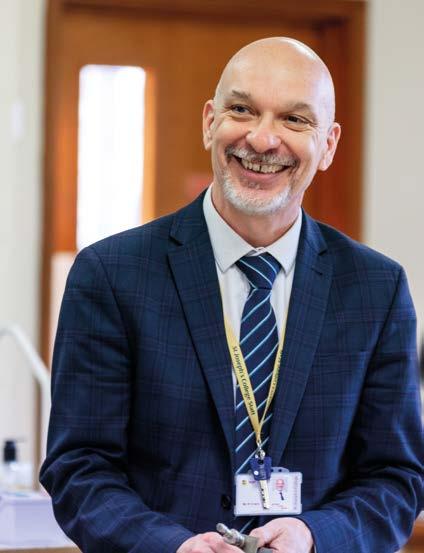
1 Development of practical skills in Physics
Key practical skills will be covered through practical tasks throughout the course
2 Foundations of Physics Physical quantities and units; Scalars and vectors; Measurements
3 Forces and motion Motion; Forces in action; Work, energy and power; Materials; Newton’s Laws of Motion and Momentum
4 Electrons, waves and photons Charge and current; Energy, power and resistance; Electrical circuits; Waves; Quantum physics
5 Newtonian world and astrophysics Thermal physics; Circular motion; Oscillations; Gravitational fields; Astrophysics
6 Particles and medical Physics Capacitors; Electric fields; Electromagnetism; Nuclear and particle physics; Medical imaging
Paper 1: Modelling Physics
Modules 1,2,3 & 5
Paper 2: Exploring Physics
Modules 1,2,4 & 6
Paper 3: Unified Concepts
Modules 1 - 6
Practical endorsement: students will cover set practical tasks in which their skills will be assessed internally. The skills covered will also be assessed in the written examinations. Pass/Fail Ongoing throughout the course Reported separately
There will be opportunities to hear key speakers and take part in national competitions such as the Physics Olympiad.
PROGRESSION ROUTES
Engineering, theoretical physics, computer science, aeronautics, forensic science, medicine and related areas as well as computing, communications and areas where sound, mathematical analysis is required e.g. accountancy and banking.
EDEXCEL (9PL0)
With dramatic events in both UK and US politics recently, there has never been a more exciting time to study A-level Politics. The course provides an insight into political beliefs that are central to an understanding of our modern world. It also develops analytical and evaluative skills in relation to relevant topics prevalent in the turbulent political climate of today.
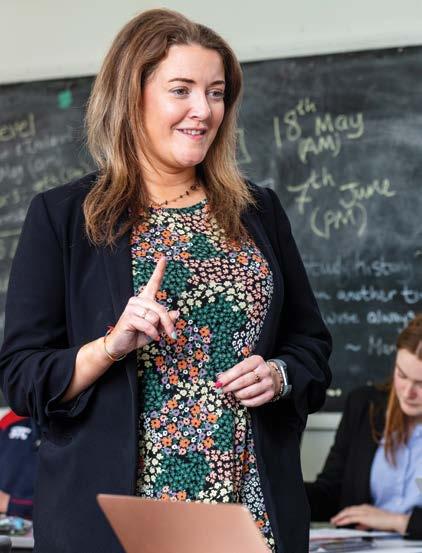
Political Participation: democracy and participation, political parties, electoral systems, voting behaviour and the media.
Core Political Ideas: conservatism, liberalism, socialism.
UK Government: the constitution, parliament, Prime Minister and executive, relationships between the branches.
Non-core political ideas, one idea from the following: anarchism, ecologism, feminism, multiculturalism, nationalism.
and federalism, US Congress, US presidency, US Supreme Court and civil rights, democracy and participation, comparative theories.
All three papers are examined with a two-hour exam and have equal weighting towards the final A-level grading.
ENRICHMENT OPPORTUNITIES
This new course in Sixth Form will be supported by an enrichment trip to London to visit the Houses of Parliament. Students will also have the opportunity to participate in Model United Nations to gain a more global perspective on politics.
An A-level in Politics provides an excellent background for careers in law, journalism, the caring professions, teaching, and a range of management and business areas.
AQA (7182)
The A-level Psychology course involves the scientific study of the human mind and behaviour. You will gain an understanding of childhood attachment and its impact on adult life; and causes and treatments for phobias and OCD. You will study group behaviour and how it can be influenced within society; gender and Forensic Psychology; as well as gaining a fascinating insight into the brain and its functions.

The course content includes:
• Social influence
• Memory
• Attachment
• Psychopathology
• Approaches in Psychology
• Biopsychology
• Research methods
• Issues and debates in Psychology
• Schizophrenia
• Gender
• Forensic Psychology
Assessment is entirely based upon examinations taken at the end of the two years.
There are numerous opportunities for enrichment within the course, including attending relevant lectures by international psychologists, such as Philip Zimbardo and Elizabeth Loftus. Previous trips have included visits to the Royal Bethlehem Hospital and the Freud Museum in London.
The subject instils skills in research, data-handling, analysis, communication and organisation that go well beyond the value of the material covered. It is, of course, relevant to those interested in Psychology at degree level, but also popular amongst students who plan to follow other paths. As a university degree, Psychology is a popular and exciting subject to study. Graduates enter a wide range of employment sectors, including teaching, advertising, sport development, social work and nursing. The list is vast.
AQA (7192)
Sociology is a broad-ranging subject that encourages students to think critically about the world around them and how society operates. Students will draw on sociological studies and current events to develop a greater understanding of the nature of social life and social processes. Key themes include inequality, social change and the power of social institutions.
The course begins by analysing the education system, including the trends in achievement by class, gender and ethnicity; the role of the education system and key policies. Students will develop a critical understanding of the different ways to research society, with a particular focus on researching education. We move on to the family, analysing issues such as changing family patterns, trends in marriage and divorce, the changing nature of childhood and the ageing population.
In Year 13, students have the choice of studying either Beliefs in Society or The Media, understanding their role, changing nature and key social issues related to them, before moving on to studying Crime and Deviance. Issues such as the differences in criminality by social groups, punishment, the role of the media and solutions to crime will be considered.
The course content includes:
• Education
• Research Methods
• Families and Households
• Beliefs in Society or The Media
• Crime and Deviance
• Sociological Theory

At the end of Year 12, students will sit two AS examinations:
At the end of Year 13, students will sit their final examinations:
Budding sociologists will benefit from relevant trips, to witness alternative forms of education, the Childhood Museum and magistrates’ courts. Regular engagement with current events both inside and outside of lessons - and a student research project at the end of Year 12 – help further develop sociological imaginations.
Sociology students develop a range of transferable skills, including critical thinking, independent research, data analysis, evaluation, communication and essay writing, which can be applied in both future educational and employment contexts. Some students have progressed to studying Sociology at higher level. The subject has benefited others moving on to International Relations and the wider Social Sciences. Studying Sociology can be of specific use for careers in the Civil Service, teaching, law, management, the police and social work.
AQA (7692)
Why choose this course?
The new A-level in Spanish builds on the knowledge, understanding and skills gained at GCSE. It develops a range of transferable skills including communication, critical thinking, research skills and creativity. Students have the opportunity to develop a greater understanding of culture and society in any Spanish-speaking country that interests them, not just Spain.

COURSE CONTENT
There are two main areas of thematic content to be studied across the two-year course:
Social Issues and Trends
• Aspects of Hispanic Society
• Multiculturalism in Hispanic Society
Political and Artistic Culture
• Artistic Culture in the Hispanic World
• Aspects of political life in the Hispanic World GRAMMAR
Students will develop their linguistic skills to become confident in using intermediate and more complex structures actively. They will be exposed to a range of language, both in terms of style and also from different parts of the Hispanic World.
1
2
Students will study a film from Spain alongside the unit of Spanish Identity and a novel from Latin America in Year 13.
Throughout the two-year course, students will have unit tests, practise speaking tests, as well be called upon to research and present themes in class. Over the two years, students will build up a file of research and analysis of current events around the Hispanic World and will be able to reflect on their findings in Spanish. There are three papers taken in Year 13 examining grammar knowledge, critical understanding of the themes and texts and a presentation of students’ research.
Listening and responding to spoken passages from a range of contexts and sources (all questions in Spanish), reading and responding to a variety of texts written for different purposes (all questions in Spanish), translation of 100 words into Spanish and translation of 100 words into English
Two critical appreciation essays (approx 300 words each) on the concepts and issues covered in the two books or the book and film studied
Discussion of one of the sub-themes based on a stimulus card, presentation and discussion of Individual Research Project
• A four-day trip when students will use their language in the classroom and on cultural activities and visits
• An exchange programme with a partner school in Spain when students can live the language
• Cultural day trips, combining theatre or gallery visits, dining out and bespoke activities to enhance the experience.
An A-level in Spanish offers an enhanced range of employment prospects and preparation for life as a global citizen. It will be personally rewarding and is a qualification highly regarded by universities and colleges. Spanish A-level is compatible with other subjects as part of modular or joint honours degree courses, and may be studied alongside Engineering, Law, Science, Business, Education, Journalism, Leisure and Tourism, Art and Design and Media subjects. On average, salaries are £3k to £5k higher for those with a language.
BTEC NQF LEVEL 3 Extended Diploma (3 A-levels) & BTEC Diploma (2 A-levels)
This vocational subject has many practical elements which can lead on to gaining extra coaching qualifications and the types of assignments that can be beneficial for students deciding on going to university or straight into a career within the sports industry.
Units covered vary from developing coaching skills and sports psychology to physiology, allowing students the flexibility to branch into a variety of areas as they decide what they wish to specialise in.
• Work-related activities help to develop students’ behavioural skills
• Classroom style teaching
• Project work
• Practical performance
• Creative thinking
• Presentation skills
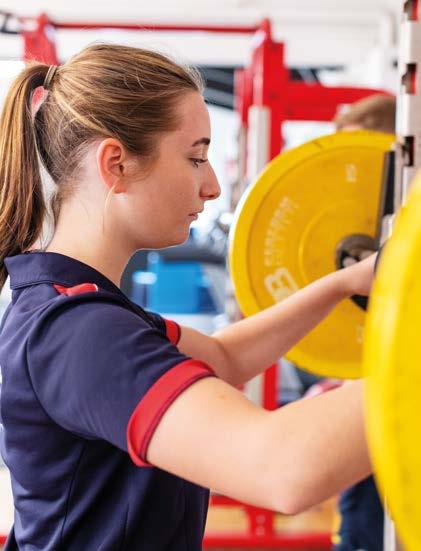
More employers and higher education institutions than ever before are choosing BTEC-qualified candidates for their academic knowledge and practical skills.
• Careers in the sport and active leisure industry
• Health, wellbeing and sport
• Developing coaching skills
• Applied coaching skills
• Research project in sport
• Sport development
• Self-employment in sport and physical activity
• Anatomy and physiology in sport
• Fitness testing
• Fitness training
• Nutrition for physical performance
• Organising events in sport and physical activities
• Rules, regulations and officiating in sport
• Sports psychology
• Sporting injuries
• Technical and tactical skills in sport
Both the three and two A-level equivalents are assessed by coursework through presentations, reports, essays, exhibitions, discussions, group work and individual assessments. Students will earn a Pass, Merit or Distinction for each unit and the overall grade for the course will be assessed on the level of achievement in all units. Students who perform exceptionally throughout the course will be awarded a Distinction star grade.
This course will prepare you for a career in the sport industry or act as a stepping stone to a higher education course at university. Our students progress to a number of leading universities for sport each year. St Joseph’s College also has a dual career partnership programme with Ealing Trailfinders RC and Brunel University London for top flight rugby players. The Extended Diploma is equivalent to three A-levels. Lessons will typically take place in the morning allowing a detailed afternoon of individual and team training in one of our focus sports, whilst also providing opportunities to develop coaching and teaching skills with the Sports Department.
Additional A-levels may be taken in conjunction with this subject.
Why choose this course?
Are you creative and resourceful? Do you dream of designing your own clothes and seeing them featured on a catwalk?
Then A-level Textiles could be for you.
Textiles A-level is a practical course that will enable you to develop your skills and practical understanding of printed and digital textiles, fashion design and accessories. It is 60% practical portfolio and 40% practical exam.
The course embraces new and traditional approaches to textile design, including digital designing, fabric printing, monoprinting, relief printing, screen printing, tie-dye, batik, spraying, transfer, fabric construction, stitching, appliqué, patchwork, padding, quilting, embroidery, weaving, knitting, felting and mixed-media applications. During the course you will also learn how to design your own label, from initial concepts through to fashion photoshoots, exploring make-up to complement the garments you have made.
You will also explore a diverse range of artists and influential designers, including Dior, Chanel, Vivienne Westwood, Mary Quant and McQueen to inspire your creations.
By exploring socio-economic influences, you will be encouraged to take risks and develop your own unique style.

Component 1 (H604/01) A coursework portfolio exploring Textiles design based upon themes and ideas developed from a range of starting points. There are three major elements which students will be assessed upon: supporting designs, practical work and a related study. The related study incorporates two major elements; theory and practical work.
Component 2 (H604/02) An externally set assignment incorporates two major elements: supporting studies and practical work. Students will respond to the externally set question from an early released paper during the Lent term. Candidates are given a minimum of three weeks in which to plan and prepare.
Candidates are then given 15 hours of controlled time in which to develop their ideas into a final outcome/realisation.
Working with artists, visits to leading galleries and museums, including the Sainsbury Centre and the V&A, London. There are also further exciting opportunities to study and explore culture, art and fashion trends when visiting international locations, including Rome, Amsterdam and Paris.
A-level Textiles complements other courses, such as Photography, Digital Media, Fine Art, English Literature and History. Many of our creative students continue their passion by applying to diploma and degree courses at the London College of Fashion.
St Joseph’s College EAL department provides specialised IELTS lessons for students with English as an Additional Language. IELTS is an internationally-recognised test which shows the overall language ability of people who want to study or work in English-language environments. At St Joseph’s College, we work on the Academic English test, which is most suitable for students applying for university or college.
The lessons are not just focused on the exam, but also on building cultural knowledge of the English-speaking world and improving our students’ overall ability in academic English. Integrating festivals and using a variety of authentic material in our classes mean that our IELTS course is relevant to the world today.
Small classes allow our students to build good relationships with their teachers and we also arrange one-to-one sessions to support students in the run up to IELTS exams or to help with more specific English for other subjects.
We work together with Cambridge University Assessment to administer pre-tests throughout the year, so that students are able to take the real exam when they are best prepared for it. St Joseph’s College is an official IELTS test centre.
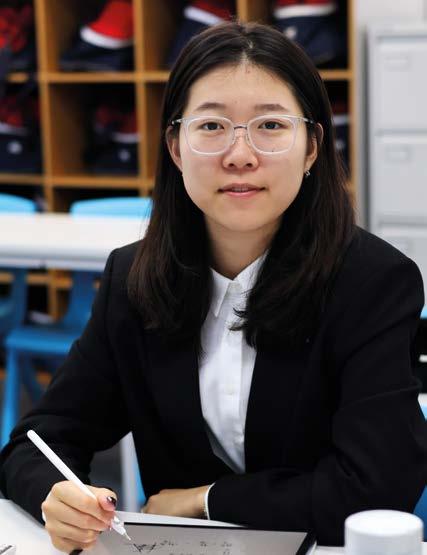
IELTS exam
Taken at an external test centre, usually all on one day. Multiple dates and venues are available throughout the year.
A range of topics covered in academic English. This can include listening to a university lecture and answering questions; writing a description of graphs and charts and speaking about their own life and experiences.
Listening
Reading
40 questions, approximately 30 minutes
40 questions, one hour
Writing Two tasks, one hour
Speaking Three parts 11-14 minutes
• Day trip to London to see a West End show with bespoke lessons before and after
• Local trips in East Anglia to visit sites of cultural interest
• Classic film club

Our leavers move on to brilliant university destinations each year, but we don’t judge our success on that alone. We work hard to support and celebrate gap year aspirations, too, and, in many cases, facilitate students’ work, travel or sports goals – sometimes a combination of all three. In recent years, students have headed to Australia and the USA to play football and rugby, undertaken ski seasons and taken up support placements as gap tutors in schools here and abroad. Degree apprenticeships grow in popularity, with a number of our leavers using them as launchpads into the worlds of finance, media, insurance and engineering. Again, fully backed by our Sixth Form team. Most recent destinations include the Bank of England and Unilever. University remains the most popular option and in 2024 we saw our alumni heading for Oxford and Cambridge, York, Manchester, SOAS and all points in between.